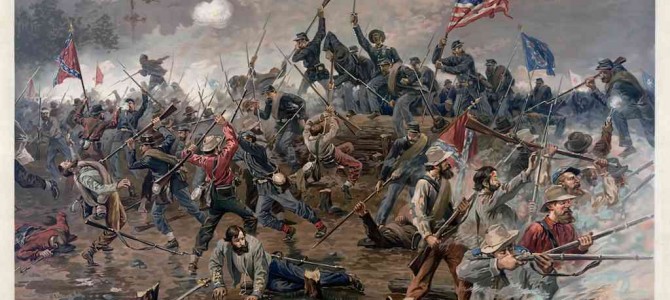
Mine eyes have seen the glory
Of the coming of the Lord;
He is trampling out the vintage
Where the grapes of wrath are stored;
He hath loosed the fateful lightning
Of His terrible swift sword;
His truth is marching on.
In 1861, Julia Ward Howe of New England took a trip with her husband and friends to Washington, D.C. The wife of a fervent abolitionist and a poet, Howe watched a public review of Union troops outside Washington when she heard them singing the tune we now know as “The Battle Hymn of the Republic.”
First documented in the American South in the early to mid-1800s, according to the Library of Congress, and credited to William Steffe, “Glory, Hallelujah” was a religious meeting song whose refrain went, “Say, brothers, will you meet us? On Canaan’s happy shore?”
The driving beat made it a natural marching song for troops and the Union Army began singing the hymn with new words, dedicated to the abolitionist John Brown, hanged for treason in Virginia after the Harper’s Ferry slave uprising. The refrain for that version included variations on the rather gritty sentiment: “John Brown’s body lies a-mouldering in the grave. His soul’s marching on.”
This was the version Howe heard when the Rev. James Freeman Clarke, traveling with her in Washington, suggested she write new lyrics to the song. Some versions of the story have Howe and her party marching alongside the troops singing along. Clarke knew of Howe’s work as a poet and writer, often published anonymously due to her husband’s objections. A fervent Union supporter and abolitionist herself, Howe traveled back to her hotel room at the Willard in Washington and woke with lyrics in her head.
I have seen Him in the watchfires
Of a hundred circling camps
They have builded Him an altar
In the evening dews and damps;
I can read His righteous sentence
By the dim and flaring lamps;
His day is marching on.
“I went to bed and slept as usual,” she later wrote. “But awoke the next morning in the gray of the early dawn, and to my astonishment found that the wished-for lines were arranging themselves in my brain. I lay quite still until the last verse had completed itself in my thoughts, then hastily arose, saying to myself, I shall lose this if I don’t write it down immediately. I searched for an old sheet of paper and an old stub of a pen which I had had the night before, and began to scrawl the lines almost without looking, as I learned to do by often scratching down verses in the darkened room when my little children were sleeping. Having completed this, I lay down again and fell asleep, but not before feeling that something of importance had happened to me.”
I have read a fiery gospel writ
In burnished rows of steel:
‘As ye deal with My contemners,
So with you My grace shall deal’:
Let the Hero born of woman
Crush the serpent with His heel,
Since God is marching on.
Shortly thereafter she sent the poem to the Atlantic Monthly, which paid her $4 for it and gave it the name the “Battle Hymn of the Republic,” publishing it on its front page in February of 1862. It became one of the most popular songs of the Civil War era and has been an enduring patriotic tune for 150 years.
He has sounded forth the trumpet
That shall never call retreat;
He is sifting out the hearts of men
Before His judgement seat;
Oh, be swift, my soul, to answer Him;
Be jubilant, my feet;
Our God is marching on.
After the war, and the success of her poem, Howe went public with her writing and activism. She founded a literary journal and a weekly suffragist magazine. She led several influential women’s groups in New England, which advocated for women’s education and the vote, before becoming the first woman inducted into the American Academy of Arts and Letters in 1908. She was also the first to suggest Mother’s Day, envisioning in her “Mother’s Day Proclamation” of 1872 a day to celebrate women’s social action and advocate for peace.
In the beauty of the lilies
Christ was born across the sea,
With a glory in His bosom
That transfigures you and me;
The Civil War and subsequent European outbreaks of violence had made Howe a pacifist. But when she died at age 91, thousands gathered to sing one of the most righteous, martial songs of all time in her honor.
As He died to make men holy,
Let us die to make men free;
While God is marching on.









